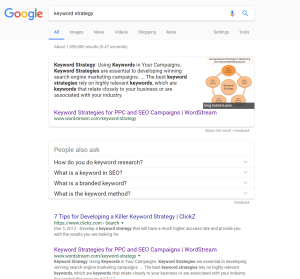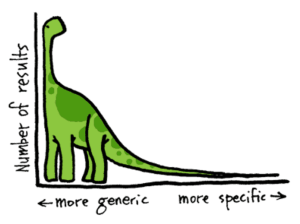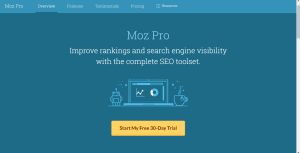When looking to increase traffic on your site or blog, using relevant keywords should be step one. A strong keyword strategy is important for SEO because it increases both site visibility and traffic.
It is a common misconception that sprinkling your chosen keyword randomly throughout your site is enough to improve SEO for B2B marketing. Unfortunately, doing so can actually result in a serious loss of business. Creating a strong keyword strategy is one of the most important things you can do to improve SEO. It is equally important to know how to do it right, as well as understand why it’s so necessary. This post will explain why a keyword strategy is important for SEO and B2B marketing, as well as explain how to create one that will draw in business.

Understanding Keyword Strategy

Getting your site to rank on Google is not as simple as plugging a keyword into a website and hoping for the best. In short, placing them into an intentional keyword strategy is just the beginning. By definition, keywords are words or phrases that describe and sum up a central idea pertinent to your business and marketing strategy. Keyword strategy means using keywords in your business and ad campaigns to attract your target market audience. When it comes to B2B marketing, keyword strategy is necessary to draw in your target audience. As B2B marketing is not the typical Buyer-to-customer setup, your keyword strategy needs a B2B marketing and relations spin. For example, if your business were looking to bring in ordinary customers, your keyword strategy might look like this:
Example 1: Say your business focuses on skincare. Your keywords might center around the idea: “how proper skin care can improve your health.” You would then begin looking for a keyword theme that sums up the idea of skincare relating to health. The takeaway message is that your business has a goal, and the right keywords will relay this goal to site visitors in a clear, concise way.
On the contrary, creating a keyword strategy for SEO and B2B marketing needs to have a less generic spin. It might look something like this:
Example 2: If your goal is B2B marketing and relations, your keyword(s) should have a revenue spin. For example, if your business sells software for eCommerce, your keywords would focus on that. Your concept might sound something like this: “the best software for B2B marketing and eCommerce.” You would then create a keyword theme around this concept, leading to use of the keyword or phrase for B2B SEO. This specific keyword concept is more likely to attract your target audience of B2B marketers and companies.

Forming Your Business’ Keyword Strategy
Now that you have an idea of what a keyword strategy is, you can begin creating one that works for B2B and your business. The following steps explain how to form a keyword strategy perfect for your target market.
Identify Your Optimization Intent
When forming a keyword strategy, the first thing business owners have to think about is optimization intent. In other words, you should be asking yourself why you want to optimize your site. What are you looking to gain? What is the end goal? For many business owners, the answers are simple:
- You want to increase traffic to your site, meaning higher visibility and better chances of visitors from your target demographic
- You want to increase conversions, meaning transforming these visitors into customers
Some websites regard visitors in different ways. For example, blogs are not as concerned with their visitor type, so long as they are drawing in visitors. In short, having an audience matters more than who makes up the audience. A business website, on the other hand, is looking for a certain type of traffic. This traffic should come from your target market. To make this happen, creating a keyword theme is necessary.
Design Your Keyword Theme
As you create your keyword list, it is important to think of all the ways someone might search for your B2B services. A great strategy is thinking of synonyms of descriptive words in your concept. If you have trouble coming up with synonyms, there are tools online for creating theme keywords out of different word combos.
Let’s try creating a keyword theme for B2B Marketing SEO:
- Example: “B2B Marketing Strategies”
- Intent: “find B2B Marketing Strategies”
- Time and Date: “2023 B2B Marketing”
- Location: “B2B Marketing Costa Mesa”
- Quality or Price: “Best B2B Marketing Strategies”
These keyword phrases help Google do a wider sweep, returning more tailored results. These keyword phrases are professionally known as “long tail keywords.” When working with a B2B SEO keyword strategy, using long tail keywords ups the chance of site traffic.

Long Tail Keywords
Long tail keywords are longer word phrases. They are specific phrases searchers are more likely to use when doing a specified search. Due to the more tailored nature of long tail keywords, it is important to create a theme around these phrases. Doing so will increase your business’ rank in search engine results. A generic single keyword is not as valuable as multiple keywords that match a user’s search. In short, long tail keywords prove that, as far as B2B SEO goes, less is not always more. Once you’ve compiled a list of “long tail keywords” that describe a certain theme, you can begin conducting your keyword research.

Keyword Research
You have now reached the final step of creating a keyword strategy: keyword research. Quality keyword research is as essential as doing market research for marketing strategy. By the same token, forming a keyword strategy for B2B marketing and SEO needs heavy research as well. When doing keyword research, there are three important factors to remember:
1. Localized Search Volume
Localized Search Volume tells you how many people are searching for a certain phrase. There are 4 factors to localized search volume:
- relevance
- specificity
- popularity
- competitiveness
Bottom line, relevant keywords should match your site’s products, services, and content. For B2B marketers, the four factors make developing keyword strategy much easier.
2. Keyword Competitiveness

Keyword competitiveness lets you know which keywords often show up on other websites. This usually means that your keyword strategy concept exists on other sites. For B2B marketing and SEO, keyword competitiveness is a little different. Since keywords and themes are more specific, there’s a lower chance of other sites using the same keywords. Of course, remember that most B2B companies write about similar issues and concepts.
Keyword Competition tools can make things much easier on your keyword strategy. Some tools include the Adwords Keyword Planner (you can tailor this for
B2B) and MozBar. Google Adwords help you discover and compare new keywords. MozBar helps you check keyword competition against other B2B business sites. Some tools must be purchased, such as Long Tail Pro. This tool identifies profitable long tail keywords focused on your content.
3. Ranking Competition
Finally, to complete keyword research, you must analyze your keyword’s ranking competition. Ranking competition helps you find out how powerful your competitors are. Some tools to help with this stage include:

These tools show what your competitors are working with so you can develop better keywords. With better keywords, your business site could be on the first page of Google Results.
Again, keyword strategy does not mean randomly sprinkling certain words throughout your website. In actuality, B2B marketing and SEO need a focused strategy to make a difference. The first step is identifying your optimization intent and tailoring it for B2B marketing and SEO. Next, create a keyword theme with specified long tail keywords and research them.
Takeaways—Know When The Juice is Worth the Squeeze
Not every keyword is worth ranking for. This may seem obvious, but it’s an important lesson for search marketers to learn. Often times we can get caught falling down the rabbit hole or chasing the long tail dragon to boost our rankings without thinking of the time and resources it takes to rank for these terms. Especially for highly competitive, high-volume keywords—it simply isn’t worth the time and effort it might take to get onto page one.
If you want to take your SEO efforts to the next level, you can count on our expert tech marketing team to get you there. We specialize in Customer Generation and have a proven track record of delivering exceptional results for our clients.
Book a call with us today to learn how you can gain a competitive edge in the world of SEO with Customer Generation. Let’s work together to drive meaningful growth and achieve your business goals!






Kathryn Ross



